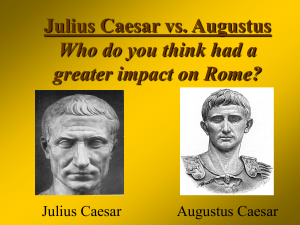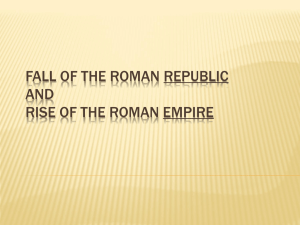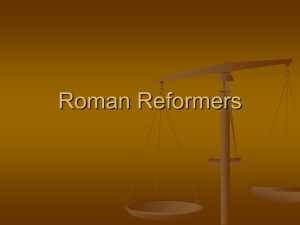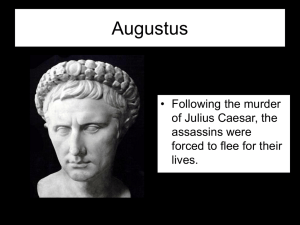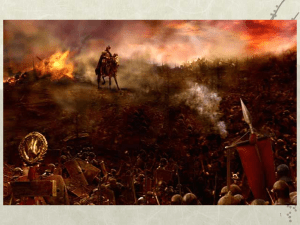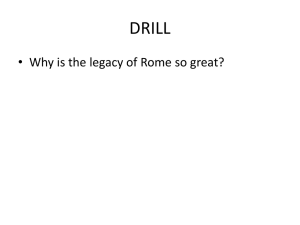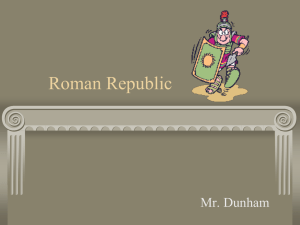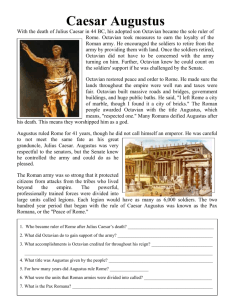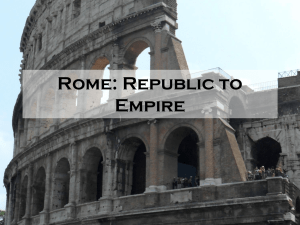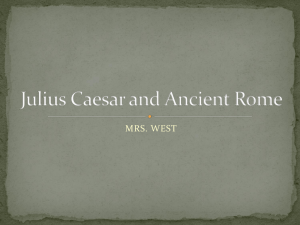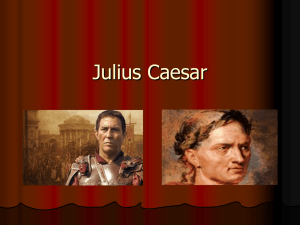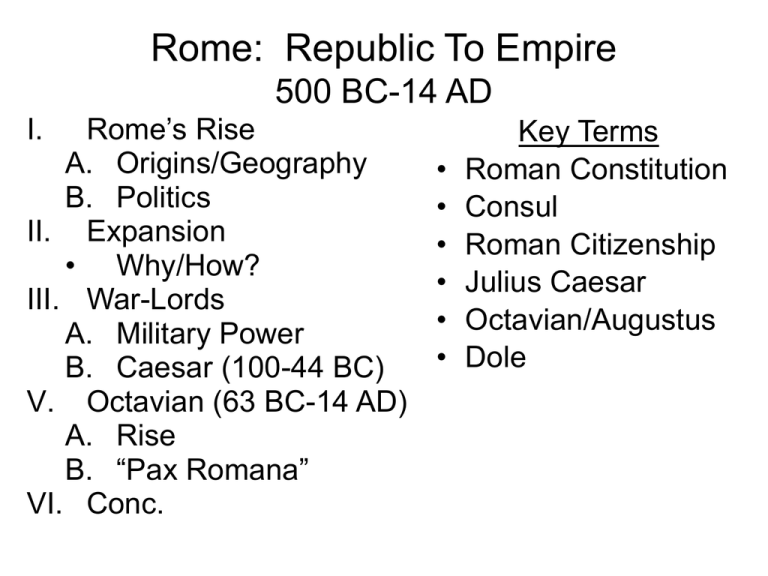
Rome: Republic To Empire
500 BC-14 AD
Rome’s Rise
A. Origins/Geography
B. Politics
II. Expansion
• Why/How?
III. War-Lords
A. Military Power
B. Caesar (100-44 BC)
V. Octavian (63 BC-14 AD)
A. Rise
B. “Pax Romana”
VI. Conc.
I.
•
•
•
•
•
•
Key Terms
Roman Constitution
Consul
Roman Citizenship
Julius Caesar
Octavian/Augustus
Dole
Mythology & Founding Rome
Romulus & Remus founded Rome. Their father, the god
Mars, left them to die but were saved by a she-wolf.
Romulus & Remus Story
Ancient Italy
• People first lived in area
around Rome about 1400
BC
• Tiber River was crucial
for farming and
transportation
– Land around Tiber
River was fertile; great
for growing a variety of
crops
Roman Constitution
(Three “Branches” To Check The Others)
Key Concept: Three “Branches” To Check The Others
• Why? --- Romans hated kings!
Consuls had supreme military and political power.
Senate-about 300 men from “leading” families;
controlled finances and foreign policy.
Assemblies:
included all adult male citizens
• Vote on passage of all laws (but usually followed
advice of Senate)
Office Of Consul
• Most important position in
the government
• Elected by male citizens
• Two were elected to a term
of one year each
• Consuls introduced
legislation & led armies
• Consuls could block or veto
each others actions
• The Senate could name one
consul “dictator” for six
months in times of crisis
Statue of Roman Consul
Rome’s Rise
(By 265 BC Italy Was United With Rome As Its
Capital)
Roman Conquest
1. The Romans had the best trained and equipped
forces that were large in number (ages 16-60)
2. Local rule and Citizenship was granted to many
they conquered
• CRUSHED any rebellion quickly & without
mercy
3. Romans built roads which bound the empire
together
Roman Army
Army’s Organization
• Divided into Legions
(5,500-6,000 troops)
• Subdivided into
Centuries with different
specialties
• Centuries were headed
by…. Centurions
Cavalry
Helmut & Gladius
Gladius = Most important weapon
Initially they were
leather, then bronze
Roman Soldiers
•
•
•
VERY highly
trained &
disciplined
Cowardice =
Unforgivable sin
Largely ate a
vegetarian diet
–
•
Wearing armor
•
Food = type of
porridge
Soldiers received
little or no pay
Victory in battle
enabled them to
divide “loot”
Wearing helmet
& shield
Roman Citizenship
1. Included: All over 15 whose parents were
citizens or individuals granted citizenship.
2. Rights: Immunity from torture; right to appeal
& suffrage (vote—for males).
3. Responsibilities: Military Service (males 1660); can’t hold office unless 10 year military
veteran.
Roman “Civilization”
(City Walls & Roads)
Residential
FORUM
Businesses
Romans & Construction
• Romans built triumphal arches (and other
monuments) to commemorate military victories.
Arch Of Titus, Rome
1st Century AD
Celebrates “sack” of Jerusalem in 70 AD
Arch Of Constantine, Rome
4th Century AD
War-Lords & Military Power
• Military leaders eventually had a tremendous
amount of political power
– Successful generals brought wealth to the
state
• Military leaders = Hero worship
• Loyalty oaths taken for generals; not country
(Rome)
• Republican form of government began to break
down
Gaius Julius Caesar
•
•
•
•
From a wealthy family
Commissioner of public works
59 BC elected consul
Very successful general
– Conquered Gaul (modern
day France)
• Civil war in Rome (49-45 BC)
among different generals
• Caesar won the civil war and
was named dictator
(100-44 BC)
Gaius Julius Caesar
• Caesar’s actions led to an
end of the Roman
Republic
• Rome Constitution was
abolished; no more
checks & balances
Bust: Julius Caesar
Julius Caesar: Historical Background
Caesar’s Impact Today
• Updated the calendar (365 days)
• Month of his birth is July
• Caesarian Section…?
Octavian/Augustus
(31 BC-14 AD)
• Following Caesar’s death
more civil war raged
among different war-lords
• Octavian was Caesar’s
grand nephew
• Ushered in the “Pax
Romana” = Tremendous
Prosperity
Octavian/Augustus’s
Pax Romana
1. Decentralized government by allowing more local
control
2. Transformed city life by establishing police & fire
departments; improved sewers & access to water
3. Established the dole
4. Concern: breakdown in “traditional Roman values”
– Instituted religious and social reforms
– Laws curbed adultery and pre-marital sex &
rewarded large families
The Dole
• City of Rome couldn’t produce enough food to
feed all the people living there
• The Government provided free grains which was
baked for bread
Conclusion
• Rome began as a Republic: Checks &
Balances—limited government
• Republic successfully spread
• War-lords sought individual power
• Caesar & Augustus ended Republic &
brought Empire
• Possible essay question (two parts):
– How & why did it spread?
– What was most important trait which
influenced Western Civilizations?
Rome: Republic To Empire
500 BC-14 AD
Rome’s Rise
A. Origins/Geography
B. Politics
II. Expansion
• Why/How?
III. War-Lords
A. Military Power
B. Caesar (100-44 BC)
V. Octavian (63 BC-14 AD)
A. Rise
B. “Pax Romana”
VI. Conc.
I.
•
•
•
•
•
•
Key Terms
Roman Constitution
Consul
Roman Citizenship
Julius Caesar
Octavian/Augustus
Dole

